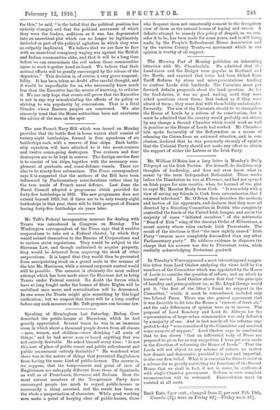Speaking at Birmingham last Saturday, Bishop Gore described the public-houses
at Barcelona, which he had greatly appreciated. Several times he was in an immense room in which about a thousand people drawn from all classes —men, women, and children—were drinking " all sorts of things," and he had never seen or beard anything that was not entirely desirable. He asked himself every time : "Is not this sort of place of public resort and public refreshment and public amusement entirely desirable ? " He wondered what there was in the nature of things that prevented Englishmen from having the same kind of public-houses. The answer is, we suppose, that the temperament and point of view of Englishmen are unhappily different from those of Spaniards, as well as of Frenchmen, Germans, and Italians. Here the most earnest members of the Temperance Party have encouraged people too much to regard public-houses as necessarily a thing accursed, and the result has been on the whole a pauperisation of character. While good working men make a point of keeping clear of public-houses, those who frequent them not unnaturally consent to the derogatory view of-them as the natural homes of toping and excess. A definite attempt to remedy this policy of despair, as we con. eider it to be, has been made for some years, and is still being made, by the People's Refreshment House Association and by the various County Trusts,—a movement which in our opinion is worthy of all support.










































 Previous page
Previous page